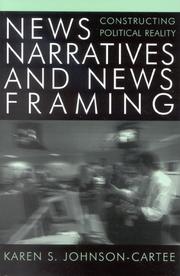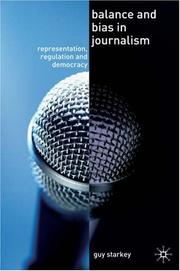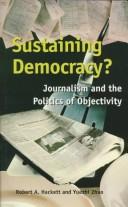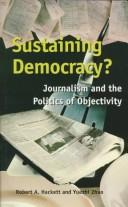| Listing 1 - 10 of 55 | << page >> |
Sort by
|
Book
ISBN: 9781841507262 9781783202287 9781783202294 1783202289 1783202297 1841507261 Year: 2013 Publisher: Bristol Intellect
Abstract | Keywords | Export | Availability | Bookmark
 Loading...
Loading...Choose an application
- Reference Manager
- EndNote
- RefWorks (Direct export to RefWorks)
Journalism --- Bias in journalism --- Slanted news --- Journalistic ethics --- Objectivity --- Press and propaganda --- Objectivity.

Abstract | Keywords | Export | Availability | Bookmark
 Loading...
Loading...Choose an application
- Reference Manager
- EndNote
- RefWorks (Direct export to RefWorks)
Journalism --- Objectivity. --- Social aspects. --- Social aspects --- Objectivity --- Press --- Bias in journalism --- Slanted news --- Journalistic ethics --- Press and propaganda

ISBN: 1403992487 1403992495 9781403992499 9781403992482 Year: 2006 Publisher: Houndmills ; New York Palgrave Macmillan
Abstract | Keywords | Export | Availability | Bookmark
 Loading...
Loading...Choose an application
- Reference Manager
- EndNote
- RefWorks (Direct export to RefWorks)
This new book addresses a key issue in current debates around journalistic theory and practice. Drawing on his extensive research and teaching experience in this field, Guy Starkey offers a clearly structured, easily accessible discussion of "balance" in the media, and the difficulties inherent in both achieving and measuring it. Providing an analysis of theoretical issues, an exploration of practical considerations, and a review of methods for assessing journalistic output, it will appeal to students of journalism and media studies.
Journalism --- Writing (Authorship) --- Literature --- Publicity --- Fake news --- Bias in journalism --- Slanted news --- Journalistic ethics --- Objectivity --- Press and propaganda --- Objectivity.

ISBN: 1551930137 9781551930138 Year: 1997 Publisher: Chicago (Ill.) : Garamond press,
Abstract | Keywords | Export | Availability | Bookmark
 Loading...
Loading...Choose an application
- Reference Manager
- EndNote
- RefWorks (Direct export to RefWorks)
Journalism --- Press and politics --- Bias in journalism --- Slanted news --- Journalistic ethics --- Objectivity --- Press and propaganda --- Political aspects --- Objectivity. --- Political aspects.
Book
ISBN: 0190492376 019049235X 0190492368 Year: 2018 Publisher: New York, NY : Oxford University Press,
Abstract | Keywords | Export | Availability | Bookmark
 Loading...
Loading...Choose an application
- Reference Manager
- EndNote
- RefWorks (Direct export to RefWorks)
Can journalists use data in order to produce better journalism? In this text, C.W. Anderson traces the genealogy of data journalism and its material and technological underpinnings, arguing that the use of data in news reporting is inevitably intertwined with national politics, the evolution of computable databases, and the history of professional scientific fields. This work shows how the changes in specifically journalistic understandings of evidence can help us think through the current 'digital data moment' in ways that go beyond simply journalism.
Journalism --- History --- Objectivity. --- Bias in journalism --- Slanted news --- Journalistic ethics --- Objectivity --- Press and propaganda --- Writing (Authorship) --- Literature --- Publicity --- Fake news
Book
ISBN: 019006711X 0190067098 Year: 2020 Publisher: New York, NY : Oxford University Press,
Abstract | Keywords | Export | Availability | Bookmark
 Loading...
Loading...Choose an application
- Reference Manager
- EndNote
- RefWorks (Direct export to RefWorks)
How do journalists know what they know? Who gets to decide what good journalism is and when it's done right? This text contends that, despite thoughtful explorations of the role of publics in journalism, the profession's methodologies and practices still don't adequately address matters of race, gender, intersectionality and settler colonialism. Drawing on their five years of research with journalists in the US and Canada, in a variety of news organizations from startups and freelancers to mainstream media, the authors investigate modern journalism's founding ideals and methods and their relationship to power to examine emerging multiple journalisms.
Journalism. --- Journalism --- Objectivity. --- Bias in journalism --- Slanted news --- Journalistic ethics --- Objectivity --- Press and propaganda --- Writing (Authorship) --- Literature --- Publicity --- Fake news
Book
ISBN: 0429032269 0429628609 9780429628603 9780429032264 9780429626968 0429626967 9780429625329 0429625324 9780367145460 0367145456 9780367145453 Year: 2020 Publisher: London Routledge
Abstract | Keywords | Export | Availability | Bookmark
 Loading...
Loading...Choose an application
- Reference Manager
- EndNote
- RefWorks (Direct export to RefWorks)
The Roots of Fake News argues that fake news' is not a problem caused by the power of the internet, or by the failure of good journalism to assert itself. Rather, it is within the news's ideological foundations - professionalism, neutrality, and most especially objectivity - that the true roots of the current crisis' are to be found. Placing the concept of media objectivity in a fuller historical context, this book examines how current perceptions of a crisis in journalism actually fit within a long history of the ways news media have avoided, obscured, or simply ignored the difficulties involved in promising objectivity, let alone truth'. The book examines journalism's relationships with other spheres of human endeavour (science, law, philosophy) concerned with the pursuit of objective truth, to argue that the rising tide of fake news' is not an attack on the traditional ideologies which have supported journalism. Rather, it is an inevitable result of their inherent flaws and vulnerabilities. This is a valuable resource for students and scholars of journalism and history alike who are interested in understanding the historical roots, and philosophical context of a fiercely contemporary issue.
Journalism --- Fake news. --- News, Fake --- Disinformation --- Hoaxes --- Bias in journalism --- Slanted news --- Journalistic ethics --- Objectivity --- Press and propaganda --- Objectivity. --- Newspapers

ISBN: 9781551930138 Year: 2010 Publisher: Toronto University of Toronto Press
Abstract | Keywords | Export | Availability | Bookmark
 Loading...
Loading...Choose an application
- Reference Manager
- EndNote
- RefWorks (Direct export to RefWorks)
Journalism --- #KVHA:Media --- #KVHA:Journalistiek --- #KVHA:Objectiviteit --- #KVHA:Pers en politiek --- Press and politics --- Bias in journalism --- Slanted news --- Journalistic ethics --- Objectivity --- Press and propaganda --- Political aspects

ISBN: 0742536629 1461639557 9781461639558 9780742536623 0742536637 9780742536630 Year: 2005 Publisher: Lanham, Md Rowman & Littlefield Publishers
Abstract | Keywords | Export | Availability | Bookmark
 Loading...
Loading...Choose an application
- Reference Manager
- EndNote
- RefWorks (Direct export to RefWorks)
News Narratives and News Framing is a revealing look at how the media's construction of news affects our political, economic, and social realities. In this introduction to the theory behind news framing, Karen Johnson-Cartee pulls together elements from communication, journalism, politics, and sociology to create a picture of how news forms these realities for the public. With its comprehensive reference section and suggestions on how to influence the news agenda, this is a beneficial resource for students in political communication, media criticism, and communication theory.
Journalism --- Bias in journalism --- Slanted news --- Journalistic ethics --- Objectivity --- Press and propaganda --- Press --- Social aspects. --- Objectivity. --- Social aspects --- Mass communications --- Pragmatics
Book
ISBN: 0231542224 9780231542227 9780231175067 0231175078 023117506X Year: 2016 Publisher: New York : Columbia University Press,
Abstract | Keywords | Export | Availability | Bookmark
 Loading...
Loading...Choose an application
- Reference Manager
- EndNote
- RefWorks (Direct export to RefWorks)
Over the past decade, American outlets such as PolitiFact, FactCheck.org, and the Washington Post's Fact Checker have shaken up the political world by holding public figures accountable for what they say. Cited across social and national news media, these verdicts can rattle a political campaign and send the White House press corps scrambling. Yet fact-checking is a fraught kind of journalism, one that challenges reporters' traditional roles as objective observers and places them at the center of white-hot, real-time debates. As these journalists are the first to admit, in a hyperpartisan world, facts can easily slip into fiction, and decisions about which claims to investigate and how to judge them are frequently denounced as unfair play. Deciding What's True draws on Lucas Graves's unique access to the members of the newsrooms leading this movement. Graves vividly recounts the routines of journalists at three of these hyperconnected, technologically innovative organizations and what informs their approach to a story. Graves also plots a compelling, personality-driven history of the fact-checking movement and its recent evolution from the blogosphere, reflecting on its revolutionary remaking of journalistic ethics and practice. His book demonstrates the ways these rising organizations depend on professional networks and media partnerships yet have also made inroads with the academic and philanthropic worlds. These networks have become a vital source of influence as fact-checking spreads around the world.
Journalism --- Journalistic ethics. --- Professional ethics --- Bias in journalism --- Slanted news --- Journalistic ethics --- Objectivity --- Press and propaganda --- Objectivity. --- Moral and ethical aspects
| Listing 1 - 10 of 55 | << page >> |
Sort by
|

 Search
Search Feedback
Feedback About UniCat
About UniCat  Help
Help News
News